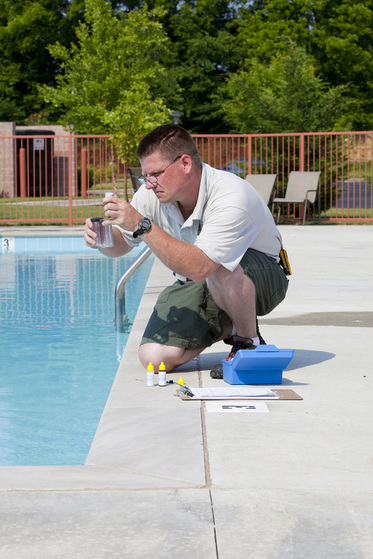water testing
Elkhart Pools knows that your pool water needs to be as safe as possible. Germs and bacteria can lurk around dirty water and it is vital that it’s cleaned correctly. We’ll test your water and make sure it’s good to go from all angles. Pool water should be tested on a weekly basis for proper pH and chlorine levels. Our team is skilled in swimming pool water testing. Our professionals understand how to test water and when it needs tested. Elkhart Pools can also test your pool for metals like iron and copper.
|
|
When you look at a well-maintained swimming pool, the water just looks like pure water. It looks perfectly clear, and you can see the light blue of the vinyl pool lining that gives the pool and ocean-like ambience. In reality, if you just fill your swimming pool with water and hope for the best, you are in for a big disappointment. After a few days, it will not look so pretty, and it will be so full of germs that it will be unsafe for swimming. Even if algae have not formed a green slime across the surface of the surface of the pool, standing water is an ideal breeding ground for bacteria. Swimming pools actually need to be treated with a variety of chemicals to prevent the growth of bacteria and algae.
It is important to test the chemical levels in your pool water, as well as the pH of the water, at least once per week. You can get all the chemicals and test strips you need at Elkhart Pools. We can even build a compartment in your pool deck for safe storage of your pool chemicals, or, if you are too busy to test your pool water, we can send a technician to you to test your pool water and perform other pool maintenance every week.
The most important chemical for preventing the growth of bacteria and mold in your pool is chlorine. By itself, chlorine is a yellowish green gas that can cause injury to eyes, mucous membranes, and skin if present in sufficient concentrations. Chlorine compounds for pools are sold in the form of tablets, granules, and solutions that are similar in composition to household bleach. (They have important differences, though; household bleach is not a substitute for pool chlorine, and you should not put bleach in your pool water.) Chlorine levels are maintained by keeping a chlorine tablet in an automatic feeder in the pool and also by adding shock treatment, a concentrated chlorine solution, to your pool once per week. Chlorine becomes ineffective when exposed to sunlight, pools also need cynauric acid to protect the chlorine, but too much cynauric acid will also render your pool’s chlorine ineffective. The ideal chlorine level is between one and three parts per million, and the ideal cynauric acid level is 40 parts per million or less. The pH of your pool water should be between 7.2 and 7.6.
Are you ready to schedule your next water testing? Call Elkhart Pools today!
It is important to test the chemical levels in your pool water, as well as the pH of the water, at least once per week. You can get all the chemicals and test strips you need at Elkhart Pools. We can even build a compartment in your pool deck for safe storage of your pool chemicals, or, if you are too busy to test your pool water, we can send a technician to you to test your pool water and perform other pool maintenance every week.
The most important chemical for preventing the growth of bacteria and mold in your pool is chlorine. By itself, chlorine is a yellowish green gas that can cause injury to eyes, mucous membranes, and skin if present in sufficient concentrations. Chlorine compounds for pools are sold in the form of tablets, granules, and solutions that are similar in composition to household bleach. (They have important differences, though; household bleach is not a substitute for pool chlorine, and you should not put bleach in your pool water.) Chlorine levels are maintained by keeping a chlorine tablet in an automatic feeder in the pool and also by adding shock treatment, a concentrated chlorine solution, to your pool once per week. Chlorine becomes ineffective when exposed to sunlight, pools also need cynauric acid to protect the chlorine, but too much cynauric acid will also render your pool’s chlorine ineffective. The ideal chlorine level is between one and three parts per million, and the ideal cynauric acid level is 40 parts per million or less. The pH of your pool water should be between 7.2 and 7.6.
Are you ready to schedule your next water testing? Call Elkhart Pools today!


